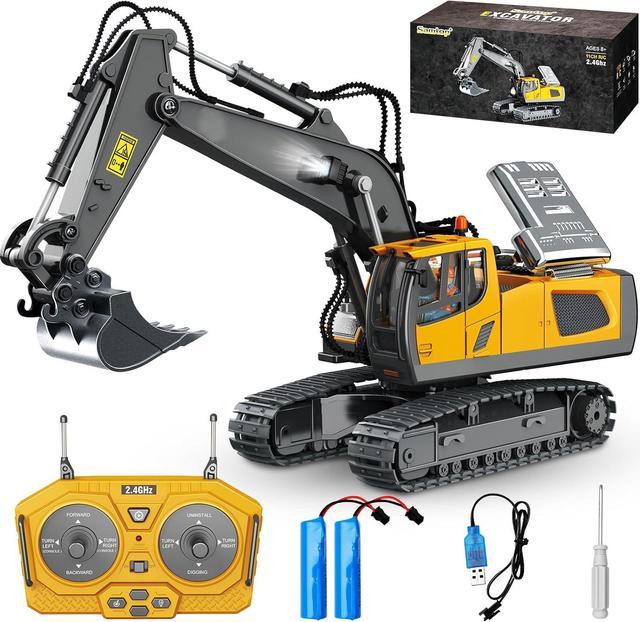How to Choose the Right rc excavator for Your Specific Project Needs
Recognizing Just How Excavator Functions and Its Influence On Effectiveness
Excavators play an important role in building and mining operations, counting on a complex interaction of mechanical and hydraulic systems. Their capacity to perform a range of jobs rests on both their design and the innovation incorporated within. Recognizing these parts can greatly affect functional efficiency and performance. As advancements proceed to reshape the market, one have to take into consideration exactly how these adjustments will certainly influence future techniques and performance.
The Essentials of Excavator Mechanics

The Duty of Hydraulic Systems in Excavators
At the heart of excavator operation exists the hydraulic system, which plays a pivotal function in powering the equipment's movements and functions. This system utilizes pressurized hydraulic fluid to transfer energy, making it possible for various actions such as lifting, excavating, and moving. By utilizing the principles of hydraulics, excavators can carry out jobs with impressive accuracy and pressure, boosting total functional efficiency.The hydraulic system is composed of key components, consisting of shutoffs, cylinders, and pumps, which work together to regulate the circulation and instructions of the liquid. When the operator involves the controls, the hydraulic liquid is routed to certain cyndrical tubes, converting the operator's commands right into physical activity. This system enables for smooth and responsive actions, which are essential in building and construction and excavation atmospheres. double e volvo rc excavator. The effectiveness of the hydraulic system directly influences the productivity and versatility of the excavator, making it an essential component in modern-day excavation processes
Trick Elements of an Excavator
Recognizing the crucial components of an excavator is necessary for comprehending how this effective equipment operates. An excavator consists of numerous considerable aspects, including the undercarriage, residence, bucket, boom, and arm. The undercarriage gives stability and movement, usually featuring tracks or wheels to browse numerous terrains. Your house contains the engine and hydraulic systems, enabling the operator to regulate activity and power the device. The boom expands from the home, enabling vertical reach, while the arm attaches to the container, facilitating excavating and training operations.Additionally, the taxi houses the driver, geared up with controls for specific maneuvering. Each of these parts plays a vital duty in the excavator's overall performance, adding to its effectiveness and performance on construction sites. Understanding these components helps in maintaining and maximizing excavator performance, guaranteeing tasks are completed safely and efficiently.
Accessory Convenience and Its Advantages
Accessory convenience is a vital facet of excavators, making it possible for operators to switch between various tools tailored for specific jobs. This flexibility not just enhances job effectiveness yet likewise adds to cost-effectiveness by reducing the demand for multiple machines. Understanding the various kinds of add-ons readily available can considerably influence the general performance and capability of an excavator on work websites.
Kinds of Accessories
While excavators are largely recognized for their excavating capacities, their real adaptability hinges on the wide variety of accessories readily available. These accessories improve the excavator's functionality, allowing it to do various tasks beyond excavation. Usual accessories consist of containers (for digging and scooping), hydraulic thumbs (for realizing products), and augers (for piercing holes) Grapples are utilized for relocating and managing debris, while rippers can separate hard surface areas. Various other specialized accessories, such as trenchers and rakes, make it possible for excavators to adjust to specific task requirements. This variety not only boosts the maker's utility across various markets, including construction, demolition, and landscape design, however likewise enables operators to customize their equipment to fulfill certain project needs effectively.
Increased Work Efficiency
Optimizing job performance is a key advantage of using different excavator attachments. Different add-ons allow an excavator to perform several jobs without requiring to switch over equipment, conserving beneficial time and labor. Using a hydraulic hammer can damage concrete while a pail add-on can excavate soil, allowing a smooth operations. This flexibility reduces downtime related to devices adjustments and improves efficiency on-site. Furthermore, specialized add-ons improve accuracy in jobs such as grading or landscaping, resulting in better outcomes. The ability to adapt to different job requirements not only enhances operations yet additionally decreases the requirement my link for extra machinery, guaranteeing that projects are completed swiftly and properly. On the whole, add-on versatility considerably adds to increased work efficiency in excavation work.
Cost-Effectiveness and Versatility
Cost-effectiveness is a substantial benefit of using functional excavator add-ons. These add-ons enable a single excavator to perform numerous jobs, decreasing the demand for extra machinery and labor - double e volvo rc excavator. By changing between buckets, hammers, and grapples, drivers can take on different projects, from excavating to demolition, thus optimizing equipment use. This versatility not only decreases operational prices however likewise minimizes downtime related to altering equipment. In addition, the capability to customize excavators with specialized add-ons boosts productivity, as they can effectively handle diverse tasks according to project needs. In conclusion, the combination of cost-effectiveness and flexibility in excavator attachments adds browse this site to enhanced functional effectiveness and resource appropriation in construction and excavation tasks

Advanced Technology in Modern Excavators
Modern excavators are significantly furnished with sophisticated innovation that transforms excavation procedures. Automation improves operations, while boosted fuel efficiency reduces operational prices. Furthermore, wise control systems improve accuracy and security, noting a considerable evolution in excavation tools.
Automation in Excavation Processes
As excavation modern technology advances, automation has emerged as a crucial component in boosting efficiency and accuracy on job websites. Modern excavators are geared up with innovative automated systems that help with tasks such as grading, digging, and trenching with marginal operator treatment. These systems utilize sensing units, GPS, and artificial intelligence algorithms to assure exact positioning and depth control, considerably minimizing the margin for mistake. Additionally, automation allows drivers to focus on critical decision-making rather than hands-on controls, bring about enhanced performance on the whole. Such developments not just improve process but likewise enhance safety by reducing human mistake in complicated operations. The assimilation of automation in excavation procedures represents a significant improvement in building and construction modern technology, driving the sector in the direction of greater efficiency and effectiveness.
Enhanced Fuel Efficiency
Developments in innovation have likewise caused considerable renovations in gas effectiveness for modern excavators. Modern equipments are outfitted with innovative engines that maximize power result while lowering gas consumption. These engines make use of cutting-edge burning innovations, such as turbocharging and direct fuel injection, to boost efficiency and effectiveness. Furthermore, lightweight products in building and construction minimize general weight, enabling less energy expense throughout operation. The intro of variable rate controls makes it possible for operators to adjust engine efficiency according to certain jobs, additionally reducing fuel usage. As an outcome, these enhancements not only lower functional prices but additionally add to ecological sustainability by minimizing emissions. On the whole, enhanced fuel effectiveness in excavators is a vital development that strengthens efficiency and economic stability in the building sector.
Smart Control Solution
While drivers navigate increasingly intricate job sites, smart control systems in excavators have actually become crucial tools for improving performance and precision. These innovative modern technologies use formulas and sensing units to keep track of different parameters such as tons weight, terrain problems, and operational efficiency. By instantly adjusting hydraulic features, wise systems enhance machine efficiency, resulting in improved efficiency and minimized endure elements. Furthermore, drivers benefit from user-friendly interfaces that supply real-time responses and diagnostics, enabling notified decision-making. This integration of innovation not only enhances procedures but also lessens human mistake, adding to safer workplace. As the building industry remains to progress, clever control systems will certainly play a vital role in shaping the future of excavator effectiveness and performance.
Enhancing Functional Performance With Excavators
Excavators play an important function in improving operational effectiveness across different building and excavation jobs. Their adaptability permits for multiple tasks, including material, digging, and lifting handling, which simplifies operations and reduces the requirement for extra equipment. With powerful hydraulic systems, excavators can perform sturdy jobs with precision, significantly decreasing the time required to complete tasks. The combination of sophisticated technology, such as GPS and automated controls, even more enhances their operation, making it possible for drivers to accomplish higher accuracy and decrease material waste. In addition, contemporary excavators are created to take in less fuel and reduce discharges, adding to both cost financial savings and ecological sustainability. By utilizing excavators effectively, building and construction groups can enhance efficiency, meet job deadlines, and boost general website administration. This multifunctionality and efficiency make excavators crucial tools in the modern-day building landscape.
The Future of Excavators in Construction and Mining Industries
As the building and mining industries progress, the future of excavators is poised for considerable transformation driven by technical innovation and altering functional demands. Advancements in automation and artificial intelligence are improving excavator capabilities, allowing for improved accuracy and effectiveness in procedures. Self-governing excavators are arising, decreasing the demand for human intervention and reducing the threat of accidents.Moreover, the assimilation of telematics and IoT technology makes it possible for real-time monitoring of device efficiency and anticipating maintenance, enhancing uptime. Eco-friendly layouts, consisting of hybrid and electrical designs, are obtaining grip, lining up with sustainability objectives within the industry.Additionally, using advanced products and lighter layouts enhances gas performance while maintaining efficiency standards. As these trends development, excavators will certainly play an important duty in meeting the boosting needs for performance and safety and security in building and construction and mining, ultimately transforming functional landscapes.
Frequently Asked Concerns
Just How Do Climate Problems Impact Excavator Performance?

Climate condition significantly affect excavator efficiency, as rain and mud can prevent grip and stability, while extreme temperature levels may affect hydraulic systems. Operators has to adapt to these variables to assure suitable performance and security during operations.
What Security Measures Should Operators Adhere To While Using Excavators?
Security measures for excavator operators consist of wearing ideal personal safety devices, performing pre-operation assessments, ensuring appropriate interaction with ground workers, keeping a safe range from overhanging risks, and sticking to recognized functional methods to stop crashes.
How Usually Should Excavators Be Preserved for Optimal Performance?
Excavators should be maintained frequently to guarantee peak efficiency, typically every 250 operating hours or as defined by the producer. Routine additional hints checks boost integrity, avoid unanticipated malfunctions, and extend the life expectancy of the tools.
What Is the Average Life Expectancy of an Excavator?
The ordinary lifespan of an excavator generally ranges from 10,000 to 15,000 hours of operation. Factors affecting long life consist of upkeep techniques, running problems, and the quality of the machine itself, impacting overall efficiency and effectiveness.

Can Excavators Run on Irregular Surface Properly?
Excavators can operate successfully on irregular terrain due to their expressed styles and flexible tracks. These attributes enable them to maintain security and grip, enabling effective procedure in tough settings typically come across in building and construction and landscape design tasks. Each of these parts plays an essential duty in the excavator's total functionality, adding to its efficiency and efficiency on building and construction websites. Making the most of task performance is a main benefit of making use of various excavator accessories. While operators browse increasingly complex task websites, smart control systems in excavators have actually arised as vital devices for enhancing efficiency and precision. Excavators play a necessary role in boosting functional efficiency across various construction and excavation projects. Advancements in automation and synthetic intelligence are reshaping excavator capabilities, permitting for improved precision and efficiency in procedures.